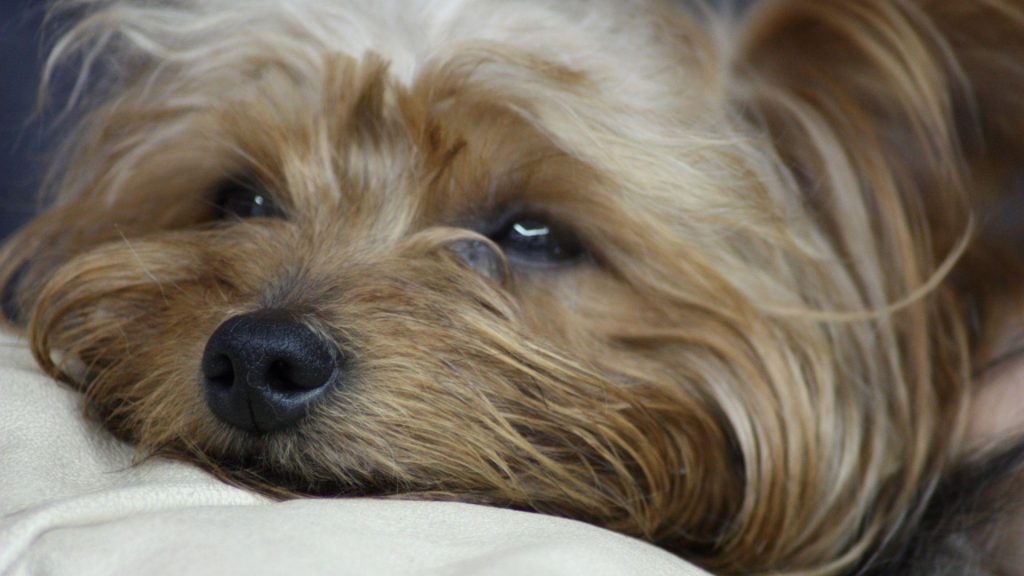Caring for a Senior Yorkshire Terrier

Recognizing the signs of aging in a Yorkshire Terrier
As your Yorkshire Terrier starts to age, it is important to be aware of the signs that indicate they are entering their senior years. One common sign is a decrease in energy levels and overall activity. Your once lively and playful Yorkie may start to prefer napping and resting more often. They may also become less interested in playing fetch or going for long walks.
Another sign of aging in Yorkshire Terriers is changes in their coat and skin condition. You may notice that their fur becomes thinner or duller, and they may develop dry or flaky skin. Additionally, some older Yorkies experience hair loss or bald patches on certain areas of their body.
It is also important to pay attention to any changes in your dog’s behavior as they age. This can include increased irritability, confusion, or disorientation. They may have difficulty hearing or seeing clearly, which can lead to them becoming startled easily or having accidents indoors.
By recognizing these signs of aging in your Yorkshire Terrier, you can provide them with the care and support they need during this stage of life.
Providing a balanced and appropriate diet for your senior Yorkie
As your Yorkshire Terrier gets older, it is important to provide them with a balanced and appropriate diet to support their aging body. Senior Yorkies may have different nutritional needs compared to when they were younger, so it’s crucial to make adjustments accordingly. One key aspect of their diet is ensuring they receive the right amount of protein. Protein helps maintain muscle mass and supports overall health in senior dogs.
In addition to protein, it’s essential to consider the fat content in your senior Yorkie’s diet. While fats are an important energy source for dogs, excessive amounts can lead to weight gain and other health issues. Opt for high-quality sources of fat such as fish oil or flaxseed oil, which contain beneficial omega-3 fatty acids that promote healthy skin and coat.
Lastly, don’t forget about carbohydrates in your senior Yorkie’s diet. Carbohydrates provide energy but should be chosen wisely. Look for complex carbohydrates like sweet potatoes or brown rice instead of simple sugars found in many commercial dog treats. These complex carbs will help keep your aging Yorkie feeling full while providing sustained energy throughout the day.
By providing a balanced and appropriate diet for your senior Yorkshire Terrier, you can ensure they receive the necessary nutrients to support their aging body and maintain good overall health. Remember that every dog is unique, so consult with a veterinarian who can guide you on specific dietary recommendations based on your Yorkie’s individual needs.
Creating a comfortable and safe living environment for your older Yorkie
Creating a comfortable and safe living environment for your older Yorkie is essential to ensure their well-being and happiness. As your Yorkie ages, they may become more sensitive to changes in temperature, so it’s important to provide them with a cozy and warm space indoors. Consider placing soft blankets or beds in areas where they like to rest, away from drafts or cold surfaces.
Additionally, make sure the living area is free from hazards that could potentially harm your senior Yorkie. Remove any small objects that they could swallow or choke on, such as toys with small parts or loose electrical cords. Keep toxic substances like cleaning products out of reach and secure cabinets if necessary.
Furthermore, consider providing ramps or steps to help your aging Yorkie navigate furniture or stairs more easily. This can reduce the risk of falls and injuries which are common in older dogs. Placing non-slip mats on slippery surfaces can also help prevent accidents.
By creating a comfortable and safe living environment for your older Yorkie, you are ensuring their physical safety while promoting their overall well-being. Taking these simple steps will not only enhance their quality of life but also give you peace of mind knowing that you have done everything possible to keep them happy and healthy as they age gracefully.
Regular exercise and mental stimulation for your senior Yorkshire Terrier
Regular exercise and mental stimulation are crucial for maintaining the overall health and well-being of your senior Yorkshire Terrier. As dogs age, they may become more prone to weight gain and muscle loss, making regular exercise even more important. Engaging in physical activities such as daily walks or gentle play sessions can help keep their joints flexible, muscles toned, and maintain a healthy weight.
In addition to physical exercise, providing mental stimulation is equally essential for your senior Yorkie’s cognitive health. Mental exercises like puzzle toys or interactive games can help keep their minds sharp and prevent boredom. This not only helps them stay mentally alert but also provides an outlet for any excess energy they may have.
It’s important to note that while exercise is beneficial for older Yorkies, it should be tailored to their individual needs and limitations. Be mindful of any pre-existing conditions or joint problems that may require modifications in their exercise routine. Consulting with your veterinarian will ensure you create an appropriate plan that supports your senior Yorkshire Terrier’s specific needs while keeping them active and engaged throughout their golden years.
Maintaining proper grooming and hygiene for your aging Yorkie
Proper grooming and hygiene are essential for maintaining the health and well-being of your aging Yorkshire Terrier. As your Yorkie gets older, their coat may become thinner and more prone to matting, so regular brushing is crucial. Use a slicker brush or comb specifically designed for Yorkshire Terriers to gently remove tangles and prevent mats from forming. Pay special attention to areas like the ears, tail, and belly where tangles are more likely to occur.
Bathing your senior Yorkie should be done on a regular basis but not too frequently as it can strip their skin of natural oils. Use a mild shampoo formulated for dogs and make sure to rinse thoroughly to avoid any residue that could cause irritation. After bathing, dry them thoroughly with a towel or hairdryer set on low heat to prevent dampness which can lead to skin problems.
In addition to regular brushing and bathing, it’s important to pay attention to other aspects of grooming such as nail trimming and dental care. Trim your Yorkie’s nails regularly using dog nail clippers or have them trimmed by a professional groomer if you’re not comfortable doing it yourself. Dental hygiene is also crucial in preventing dental diseases commonly seen in senior dogs. Brushing your Yorkie’s teeth daily with canine toothpaste will help keep their teeth clean and healthy.
Understanding common health issues in senior Yorkshire Terriers
Yorkshire Terriers are known for their small size and lively personalities, but as they age, they can be prone to certain health issues. One common health issue in senior Yorkies is dental problems. As dogs get older, tartar and plaque can build up on their teeth, leading to gum disease and tooth decay. Regular dental care, including brushing your dog’s teeth and providing appropriate chew toys, can help prevent these issues.
Another common health concern in senior Yorkshire Terriers is obesity. Just like humans, older dogs may become less active and require fewer calories. However, many owners continue to feed them the same amount of food as when they were younger. This can lead to weight gain and put additional strain on their joints and organs. It’s important to monitor your senior Yorkie’s weight and adjust their diet accordingly with the guidance of a veterinarian.
Senior Yorkshire Terriers are also susceptible to eye problems such as cataracts or dry eyes (keratoconjunctivitis sicca). Cataracts occur when the lens of the eye becomes cloudy, causing vision impairment or even blindness if left untreated. Dry eyes result from a lack of tear production, leading to discomfort and potential damage to the cornea. Regular check-ups with an ophthalmologist can help detect these conditions early on so that appropriate treatment options can be explored.
By being aware of these common health issues in senior Yorkshire Terriers – dental problems, obesity, and eye conditions – you can take proactive steps towards maintaining your furry friend’s well-being during their golden years. Remember that regular veterinary check-ups are essential for early detection and prevention of any potential health concerns specific to aging Yorkies
Scheduling regular veterinary check-ups and preventive care for your older Yorkie
Regular veterinary check-ups and preventive care are essential for maintaining the health and well-being of your older Yorkie. As dogs age, they become more susceptible to various health issues, so it is crucial to schedule regular visits with your veterinarian. During these check-ups, the vet will assess your Yorkie’s overall health, conduct necessary tests, and address any concerns or symptoms that may have arisen.
Preventive care measures such as vaccinations, parasite control (including flea and tick prevention), and dental cleanings are also important for senior Yorkshire Terriers. Vaccinations help protect against common diseases that can be particularly harmful to older dogs with weakened immune systems. Regular parasite control helps prevent infestations that can lead to discomfort and potentially transmit diseases. Additionally, dental cleanings help maintain good oral hygiene in order to prevent gum disease and tooth loss.
In addition to routine check-ups and preventive care at the veterinarian’s office, it is crucial to monitor your senior Yorkie’s behavior at home for any signs of illness or discomfort. Keep an eye out for changes in appetite or water intake, weight loss or gain, lethargy, coughing or difficulty breathing, excessive thirst or urination, vomiting or diarrhea – all of which may indicate underlying health problems that require prompt attention from a professional.
By prioritizing regular veterinary check-ups and preventive care for your aging Yorkshire Terrier along with vigilant monitoring at home, you can help ensure that any potential health issues are detected early on when they are most treatable. Remember that proactive healthcare is key in providing a long-lasting quality of life for your beloved pet companion.
Managing arthritis and joint pain in senior Yorkshire Terriers
Arthritis and joint pain are common issues that can affect senior Yorkshire Terriers. As your Yorkie ages, their joints may become stiff and painful, making it difficult for them to move around comfortably. To manage arthritis and joint pain in your older Yorkie, there are several steps you can take.
Firstly, it is important to provide your senior Yorkshire Terrier with a comfortable and supportive bed. A soft cushion or orthopedic mattress can help relieve pressure on their joints while they sleep or rest. Additionally, consider using ramps or stairs to help them navigate onto furniture or into the car without putting excessive strain on their joints.
Secondly, regular exercise is crucial for maintaining joint health in senior Yorkies. Low-impact activities such as short walks or gentle play sessions can help keep their muscles strong and flexible without causing further stress on their joints. It’s important to consult with your veterinarian to determine an appropriate exercise routine based on your dog’s individual needs.
Lastly, there are various supplements available that may aid in managing arthritis and joint pain in senior Yorkshire Terriers. Glucosamine and chondroitin supplements have been shown to support joint health by reducing inflammation and promoting cartilage repair. Omega-3 fatty acids can also be beneficial for reducing inflammation associated with arthritis.
By implementing these strategies, you can help alleviate discomfort caused by arthritis and joint pain in your aging Yorkshire Terrier, allowing them to enjoy a higher quality of life as they grow older.
Adjusting to changes in behavior and adapting to your senior Yorkie’s needs
As your Yorkshire Terrier enters their senior years, it is important to be prepared for changes in their behavior and adapt to their evolving needs. One of the most common changes you may notice is a decrease in energy levels. Your once lively and active Yorkie may now prefer shorter walks or play sessions. It is essential to respect these limitations and adjust your expectations accordingly.
Another change that often occurs in aging Yorkies is an increase in sleepiness. They may spend more time napping or resting throughout the day. Creating a cozy and comfortable space for them to relax can help promote better rest and overall well-being. Providing soft bedding, a quiet area away from distractions, and ensuring they have access to fresh water are all ways you can adapt their environment to accommodate this change.
Additionally, as your senior Yorkie ages, they may experience cognitive decline which can lead to confusion or disorientation at times. Patience and understanding become crucial during these moments. Maintain a consistent routine, avoid sudden changes, and provide extra reassurance when needed. Offering plenty of mental stimulation through interactive toys or puzzles can also help keep their mind sharp.
By adjusting to these behavioral changes and adapting your care routines accordingly, you will be able to provide the best possible quality of life for your senior Yorkshire Terrier companion without causing unnecessary stress or discomfort.
Enhancing the quality of life for your senior Yorkshire Terrier through love and companionship
As your Yorkshire Terrier enters their senior years, providing them with love and companionship becomes even more important. Spending quality time with your furry friend can greatly enhance their overall well-being and happiness. Engage in activities that they enjoy, such as gentle playtime or simply cuddling on the couch. This not only strengthens the bond between you and your senior Yorkie but also helps to alleviate any feelings of loneliness or boredom they may experience.
In addition to spending time together, it is crucial to show affection towards your aging Yorkshire Terrier. Regularly petting and praising them can boost their mood and make them feel loved. Remember to be patient and understanding if they start exhibiting signs of age-related changes in behavior or temperament. Providing a calm and reassuring presence will go a long way in helping them navigate through these adjustments.
Furthermore, consider introducing new experiences into your senior Yorkie’s life to keep their mind stimulated. Take short walks in different environments or introduce puzzle toys that challenge their cognitive abilities. These mental exercises can help slow down cognitive decline associated with aging while keeping them engaged and entertained.
By prioritizing love and companionship for your senior Yorkshire Terrier, you are not only enhancing their quality of life but also strengthening the bond between you both. Your constant presence, affectionate gestures, and mental stimulation will contribute significantly to their overall happiness during this stage of life.
How can I tell if my Yorkshire Terrier is getting older?
Some signs of aging in Yorkshire Terriers include gray or white fur, loss of energy, decreased appetite, difficulty walking or jumping, and changes in behavior or temperament.
What should I feed my senior Yorkshire Terrier?
It is important to provide a balanced and appropriate diet for your senior Yorkie. Consult with your veterinarian to determine the best type of food and portion sizes for your aging pet.
How can I make my older Yorkie’s living environment comfortable and safe?
Create a comfortable and safe living environment for your older Yorkie by providing soft bedding, removing hazards such as sharp objects or slippery surfaces, and making sure the temperature is suitable for your pet.
How much exercise does my senior Yorkshire Terrier need?
Regular exercise is important for senior Yorkies, but the intensity and duration may need to be adjusted. Consult with your veterinarian to determine an appropriate exercise routine based on your dog’s health and mobility.
How often should I groom my aging Yorkie?
Maintaining proper grooming and hygiene for your aging Yorkie is essential. Regularly brush their fur, trim their nails, clean their ears, and brush their teeth to prevent any health issues.
What are some common health issues in senior Yorkshire Terriers?
Common health issues in senior Yorkshire Terriers may include dental problems, vision or hearing loss, arthritis, heart disease, and kidney or liver problems.
How often should I take my older Yorkie to the vet?
It is important to schedule regular veterinary check-ups and preventive care for your older Yorkie. Follow your veterinarian’s recommendations for how often your senior dog should be seen.
How can I manage arthritis and joint pain in my senior Yorkie?
Arthritis and joint pain are common issues in senior Yorkshire Terriers. Your veterinarian may recommend medications, supplements, physical therapy, or other treatments to manage pain and improve mobility.
What should I do if my senior Yorkie’s behavior changes?
As your Yorkshire Terrier ages, their behavior may change. It is important to adapt to these changes and provide the necessary support and care. Consult with your veterinarian if you have concerns about your dog’s behavior.
How can I enhance the quality of life for my senior Yorkshire Terrier?
Enhancing the quality of life for your senior Yorkshire Terrier can be achieved through love and companionship. Spend quality time with your pet, provide mental stimulation, and ensure their physical and emotional needs are met.






